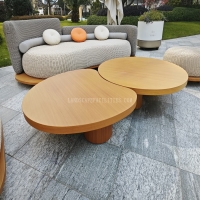Welcome to the website for landscape facilities products and knowledge.
What are the best materials for a landscape bar counter in tropical or rainforest climates?
Creating an outdoor bar counter in tropical or rainforest climates presents unique challenges. The ideal materials must withstand intense humidity, heavy rainfall, intense UV exposure, and potential insect damage while maintaining both functionality and aesthetic appeal. Through extensive research and practical application, several materials have proven exceptionally suitable for these demanding environments.
Teak stands as the premier choice for tropical bar counters due to its natural weather resistance. This dense hardwood contains natural oils that repel water, resist rot, and deter insects without requiring chemical treatments. Even when left untreated, teak weathers to an attractive silver-gray patina that blends beautifully with lush surroundings. Its non-slip surface makes it particularly safe for wet conditions, though it does require occasional cleaning to prevent mildew growth in constantly humid environments.
Ipe (Brazilian Walnut) offers similar durability with even greater density. Often called "ironwood," ipe boasts a Class A fire rating and exceptional resistance to scratches, making it ideal for high-use entertainment areas. While more expensive than teak, its incredible longevity—often exceeding 25 years even in harsh tropical conditions—makes it a worthwhile investment. The wood's rich chocolate brown color does gradually weather to silver unless maintained with specialized oils.
Concrete countertops provide excellent durability and thermal mass that helps keep drinks cool in tropical heat. When properly sealed with penetrating sealers, concrete resists moisture absorption and staining from tropical fruits and cocktails. The material's versatility allows for integrated features like built-in sinks, ice buckets, and decorative elements that mimic natural stone. Its heat resistance also makes it perfect for incorporating barbecue components into the bar design.
Stainless steel offers unparalleled practicality for particularly wet rainforest environments. The non-porous surface resists moisture completely, won't rust with proper grade selection (304 or 316 marine grade), and maintains a hygienic surface for food preparation. While it can become hot in direct sunlight, this can be mitigated through strategic shading. Its modern aesthetic provides a striking contrast against tropical foliage.
Porcelain slabs represent an emerging option that combines the appearance of natural stone with superior performance characteristics. Modern porcelain countertops are UV-resistant, scratch-resistant, and completely non-absorbent even without sealing. They maintain a cooler surface temperature than natural stone and won't fade under intense sun exposure, making them ideal for open-air tropical bars.
When selecting materials for tropical bar counters, proper installation proves equally important as material selection. All materials require adequate ventilation beneath the countertop to prevent moisture trapping, and fasteners must be corrosion-resistant (stainless steel or aluminum). Regular maintenance remains essential—even the most durable materials benefit from periodic cleaning and resealing to maintain their appearance and performance in challenging tropical conditions.
The optimal choice ultimately depends on specific aesthetic preferences, budget considerations, and willingness to perform maintenance. Teak and ipe offer natural warmth, concrete provides customizability, stainless steel delivers industrial practicality, while porcelain slabs combine visual appeal with minimal upkeep. By selecting from these proven materials and implementing proper installation techniques, you can create a stunning landscape bar counter that will withstand the test of time and tropical elements alike.
Related search:

Recommendation
Elliptical metal outdoor table with nested design, resembling wood grain, round table